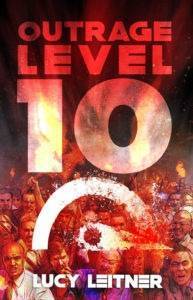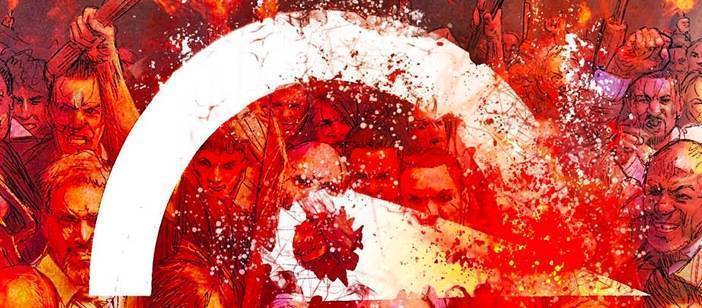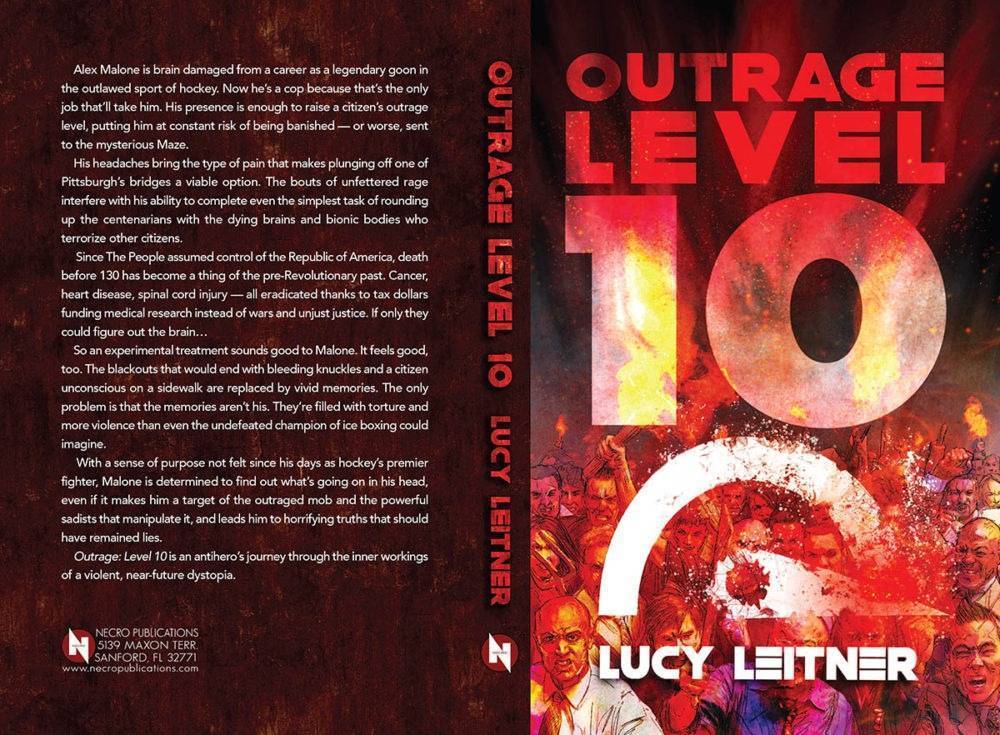“Coming February 2021, the second novel from Lucy Leitner and, man, is it a trip. A dark future where violence is judged by social media and punishable by death. A fast-paced social thriller from the author of the great Working Stiffs. Don’t miss out on this all-too timely story.” –David G. Barnett, Necro Publications
From the publisher: “Alex Malone is brain damaged from a career as a legendary goon in the outlawed sport of hockey. Now he’s a cop because that’s the only job that’ll take him. His presence is enough to raise a citizen’s outrage level, putting him at constant risk of being banished — or worse, sent to the mysterious Maze.
His headaches bring the type of pain that makes plunging off one of Pittsburgh’s bridges a viable option. The bouts of unfettered rage interfere with his ability to complete even the simplest task of rounding up the centenarians with the dying brains and bionic bodies who terrorize other citizens.
Since The People assumed control of the Republic of America, death before 130 has become a thing of the pre-Revolutionary past. Cancer, heart disease, spinal cord injury — all eradicated thanks to tax dollars funding medical research instead of wars and unjust justice. If only they could figure out the brain…
So an experimental treatment sounds good to Malone. It feels good, too. The blackouts that would end with bleeding knuckles and a citizen unconscious on a sidewalk are replaced by vivid memories. The only problem is that the memories aren’t his. They’re filled with torture and more violence than even the undefeated champion of ice boxing could imagine.
With a sense of purpose not felt since his days as hockey’s premier fighter, Malone is determined to find out what’s going on in his head, even if it makes him a target of the outraged mob and the powerful sadists that manipulate it, and leads him to horrifying truths that should have remained lies.
Outrage: Level 10 is an antihero’s journey through the inner workings of a violent, near-future dystopia.”
About the author: Lucy Leitner is the author of the horror-comedy novels Working Stiffs (2012) and Outrage: Level 10 (2021). From Arlington, Virginia (where jokes say people are dying to go), she lives in Pittsburgh, Pennsylvania (where movies say the dead live). She’s been making up scary stories since age 10, when she frightened her little sister out of sharing a room. After earning a master’s in journalism in 2010, she won an award for a piece in Justice Magazine and promptly retired from journalism. Now she’s the writer, spokesperson, and sometime hand model for a global vitamin company that tends to post more zombie content on social media than its competitors…When not scaring customers into taking their vitamins, she’s working on her next horror novel.
 “We should have flying cars by now,” Underwood Jennings said as he stared down the alley at the flat asphalt. Say what you will about corrupt politicians; if they were still around, maybe one of those snakes would have promised aerial infrastructure. Underwood scowled. There were some thoughts even he couldn’t say out loud.
“We should have flying cars by now,” Underwood Jennings said as he stared down the alley at the flat asphalt. Say what you will about corrupt politicians; if they were still around, maybe one of those snakes would have promised aerial infrastructure. Underwood scowled. There were some thoughts even he couldn’t say out loud.
“Are you asking me to discuss that on my feed?” Mackenzie Brunner applied her O-Negative lipstick in the rearview mirror of her fashionable, white 2044 Ford Pinto. She looked at her somewhat famous face through her polarized, UV-protective, sun-resistant, beta carotene-infusing sunglasses. She always asked the same question when Underwood Jennings ranted, as it seemed to assuage the rage bubbling in his speech about even the most inconsequential issues.
Underwood laughed. “You really think Making the Mirror Jealous has that kind of clout?—to be the impetus for major, yet long-overdue technological innovations?”
“I don’t know, Woody. I don’t think I’ve ever been thumped by a carmaker.”
 Mackenzie turned the Pinto out onto Negley Avenue, pulling away from Woody’s apartment building, where occupants crammed big lives into small spaces. In one of the many units inhabited by conscientious notables who wanted to lessen their physical impact on the world while leaving their mark on culture—where Mackenzie had spent eventful nights that she relived on her feed—the tenant had an ingenious system of drawers stacked floor to ceiling. He would have just as little as the man who had the least. Except for the savings account—that, he kept. The tiny apartments provided the discomfort that only the most righteous and rich would tolerate. The rich, and Underwood Jennings. Overcrowding was as prevalent in Pittsburgh as anywhere else, and, dammit, they would do their civic duty and take up less space than anyone else.
Mackenzie turned the Pinto out onto Negley Avenue, pulling away from Woody’s apartment building, where occupants crammed big lives into small spaces. In one of the many units inhabited by conscientious notables who wanted to lessen their physical impact on the world while leaving their mark on culture—where Mackenzie had spent eventful nights that she relived on her feed—the tenant had an ingenious system of drawers stacked floor to ceiling. He would have just as little as the man who had the least. Except for the savings account—that, he kept. The tiny apartments provided the discomfort that only the most righteous and rich would tolerate. The rich, and Underwood Jennings. Overcrowding was as prevalent in Pittsburgh as anywhere else, and, dammit, they would do their civic duty and take up less space than anyone else.
“They’re called engineers,” he said.
“Who?”
“The people who design cars. Maybe even aviation engineers if they ever make the flying ones.”
“Oh.” Mackenzie feigned interest as she turned onto Penn Avenue. A tent colony was erected outside of Banana Republic. Slogans written on the nylon structures and on the placards in the hands of the picketers indicated that the venerable store’s name was evocative of exploited labor in the Caribbean, of the suffering of those who toiled in those fruit-based economies. People were already walking by the shuttered shops that were set to open in 45 minutes, at 10 o’clock this Sunday morning. Wait outside early, so you don’t have to wait in line later. The time these shoppers would wait may be similar, but waiting was more pleasant before the stores were crammed to capacity.
Mackenzie drove past the protest, patting her long, pencil-straight, platinum blond hair with the magenta ends that had become her trademark and matched every article of clothing she owned. She hit her turn signal to make a left on South Aiken Avenue.
“Anyway, I’ll push for it in my meeting tomorrow.”
“Right. You think your pushing for it is going to make it happen?”
“Yes, I do. The technology has been imagined since the 1960s. At least!”
“Yeah…”
“We’ve got cars. We’ve got airplanes. Build the goddamn things! Yeah, I get that historically they all thought it would be way too difficult to control traffic that’s not on any streets. Now? Someone fucks up on the road, cuts someone off and just dips to a different altitude, you don’t think the People are going to do something about it?”
“Flying cars would be really moist.”
“They’d be more than moist! They’d be dripping. We’re just becoming complacent. No one cares anymore about making good on promises. Instead we got the Super Seniors. What I wouldn’t give to have put a straitjacket on those researchers when they were looking for a way to stop people from dying. No one thought it would work so well that we just wouldn’t die anymore. And now we have millions of these cyborgs that no one asked for. And everyone forgot about flying cars.
“Just get me to Swanson’s.”
He threw his head back, an exaggerated signal of his exhaustion in talking to Mackenzie, and leaned back in the passenger seat, his long, skinny, denim-covered legs requiring the entirety of the reclining room in the two-door sports car. His shaggy brown hair shot out in several directions against the red velvet seat back. Mackenzie thought the unruly hair was one of his sexiest traits, along with charisma and the fact that, though they’d been dating for two months, she still knew almost nothing about him. But substance seldom concerned Mackenzie, who made her name by making it with names.
She turned left, following high-end Walnut Street where more shoppers were waiting for the stores to open. Cars lined the right side of the road. The automatic braking system kicked on as a dozen pedestrians stepped into the marked crosswalk ten feet ahead of her car. No sooner had Mackenzie pressed the gas than the brakes engaged again when another five crossed. They were slow, careful not to spill the coffee from their lidless paper cups.
A Pontiac Zombie inched up behind them as they waited for the critical mass to cross. The Zombie had been in her rearview display since they turned off Negley. Mackenzie pretended not to notice. She turned left onto South Highland Street. The Pontiac followed.
“There’s a dude behind us,” Underwood said.
“So?”
“I don’t like that.”
Underwood’s omnivice beeped, Mackenzie’s a few seconds later. She’d have to get that fixed. The People’s Connection promised news updates and alerts faster than any other carrier. A lie. She’d alert Melissa at the Consumer Feed. Public humiliation should shame the pioneers of the device, which functioned on biometrics to act as a phone, mobile web, wallet, planner, entertainment system, and health tracker, into giving her a new omnivice. Maybe even one of the new models that translated thoughts into text to dictate a chit to the Chatter network without even speaking. The automatic outrage gauge that made Chatter the social network of the Revolution now detected rage in vibes as well. Since hers was a version behind the latest omnivice model, Mackenzie received the bulletin approximately two seconds after Underwood did. But looking at her omnivice while driving was a sure way to get reported. Underwood stared at his omnivice, and from the 800 dpi resolution on the screen, his face stared back.
“Wanted at the People’s Tribunal,” the text read. “For crimes against the People.” He scrolled down with his finger. “Underwood Jennings thought it was hilarious to play with a robot shower device while standing on a Holocaust Memorial. People’s outrage level: 8. Representative People’s Grievances:
‘I can’t believe someone would be so insensitive and make shower jokes on a Holocaust Memorial. The way those people were burned to death by the scalding water. Makes me sick.’
‘Hips like that think it’s ironic. That hip lifestyle—no respect for the past.’
‘Being a hip is as bad as being a Nazi!’”
And there was the incriminating photo: Underwood Jennings with the robotic shower portion of the morning machine, standing on a concrete bench.
“Swanson,” Underwood said. “Shit, Mackenzie. How was I supposed to know that was a memorial? He knew it. They’re trying to get rid of me!”
“Who’s trying to get rid of you?”
“The privileged assholes who put me in this situation to begin with.”
A megaphone emerged from the passenger-side window of the drab Pontiac behind them.
“Underwood Jennings, please step out of the vehicle,” came the voice from the megaphone. “You are wanted before a jury of your peers.”
“What’s going on, Woody?” Mackenzie asked.
“Just drive!”
Mackenzie jerked the car down a one-way street, bouncing on cobblestone past the mansions with their front yards filled with parked cars.
“Not here!” Underwood yelled, turning around to watch the People’s car in close pursuit. A banner was flung out of the rear driver’s-side window proclaiming it as such, indicating that it was now above reproach for any of its imminent traffic crimes. And that it was legally allowed to bypass the safety features like automatic braking and containment within painted traffic lanes.
Mackenzie did not have the same privileges in her Pinto. As she jerked the car to the right off the cobblestone and onto a paved street, she accelerated. Her custom-installed magenta light blinked, letting her know that she was approaching the 35-mph speed limit. The car beeped—she was exceeding it. A small piece of paper spewed from beneath the music player. The speeding ticket fell into the center console on top of the parking brake button: $95.
“We have to pull over,” she said, panic in her strained voice, her eyes darting from side to side. She glanced at Underwood, his body rigid, his head on a swivel. She tried to read his expression—she was fluent in the language of men—but as always, she couldn’t read him. She thought she caught a glimpse of panic, but not fear. Underwood didn’t have fear. And that momentary hint of panic turned into rage.
“Just drive. Get me to Swanson’s. I’ve got questions needing answers,” Underwood yelled, as he threw the ticket on the floor.
The car hit 40 mph on South Highland Street, another ticket; 45, another; 50, one more fell onto the parking-brake button.
“Woody, I—I can’t afford this.”
“Just go!”
The tires screamed, the voice of the car, as Mackenzie steered on the bending road. The banner waved in the wind of the chase, but the People’s car was still in pursuit. Mackenzie kept driving straight on Fifth Avenue as a Ford mini Escalade turned into traffic in front of them. Mackenzie jolted the car to the right to attempt to pass the Escalade, but anticipating her movement, the tiny SUV moved directly in front of them. She swerved to the left, so did the SUV. She attempted to move across the double-yellow lines but was greeted by loud honking from oncoming traffic. She shot back into the correct lane, the Escalade still in front and the People’s car now next to them in the right lane.
“Mackenzie Brunner, pull over!” The voice in the megaphone shouted from next to Underwood’s window.
“They know it’s me!” Mackenzie squealed, a bit of terror of the law of the People combined with the high that comes from hearing your name broadcast on any sort of medium, no matter how dubious.
“Of course they know it’s you. It’s your car. It has pink hearts on the doors.”
“What the hell, Woody? What did you do?”
“Nothing, babe. It’s all a big mix-up. They think I’m an agg. That I was insensitive at a Holocaust memorial. That wasn’t even marked as a memorial.” His voice took a softer tone, soothing even. Like he was telling her everything would be all right.
She assumed the role of damsel in distress, a part she had played many times. It was the act she used to trick renowned humanitarian Klaus Muesli into actions that revealed deep-seated patriarchal beliefs on the second most starred episode of her feed.
“But… what if they take me? I don’t even know what’s going on.”
“They won’t. Just get me to the South Side.”
Mackenzie slammed on the brakes and flung the wheel to the left, ditching the SUV but not the People’s car behind her. They were in an alley now, meant for nothing except local traffic. The car beeped furiously. It expelled another ticket; this one for $155. She accelerated. The SUV was now behind the Zombie. The car shot through puddles from yesterday’s watering, spraying the brick backs of the buildings that lined the narrow road. She slowed to turn the car to the right, and the automatic brakes engaged yet again when a truck with its metal walkway extended blocked the one-lane street. With the People’s car mere feet from the intersection, Mackenzie hit the reverse button and the car jolted backward from the truck. The People’s car raced forward toward them while Mackenzie watched the feed from the rear camera on the dash. Through his aviators, Underwood glared at his pursuers.
They were the People, all right. The driver was chubby, or bloated. He couldn’t make out any details besides the face. It was plain, piglike even, the ample cheeks reddish from the exasperation of the chase. Painfully human. This was his glory, to catch an agg. This pig-man would be interviewed on several feeds about his heroic representation of the People, his high-speed chase, his adventure enforcing everything that the post-Revolution Society stood for. He’d have his 15 minutes. Maybe he’d go back to his wife, and his little life, and his ordinary home and lie on his sinking mattress and resume his existence. Or, like so many others who got that tiny taste of fame, he’d get a green injection to counter the rosacea. He’d have the cheeks taken in like they were a prom dress, start his own feed, and become a Mackenzie in his own right.
The megaphone-wielding passenger was a woman, a surprise due to the deep timbre of her voice as heard through the amplification. She was just as plain as the driver—stocky, with stringy black hair cut to just above her rounded shoulders that indicated much larger hips. They were so ordinary. Bringing someone on the cusp of eternal glory must surely be a thrill.
Mackenzie pulled the car backward into the next intersection and pressed the drive button to propel the car forward. She slammed her petite, manicured foot—which had been surgically altered twice so that four-inch stiletto heels would feel natural—onto the gas pedal, breaking the 30-mph speed limit and sending her seventh speeding ticket flying from the dashboard. The People’s car was still behind them, the banner barely attached to the vehicle. Mackenzie yanked the wheel to the left, and the car sped into Oakland. The new traffic safety circle was coming up ahead of the University of Pittsburgh’s campus. The People of Pittsburgh hadn’t quite gotten used to these yet.
She entered the tight roundabout, and spun the car around the circle, the People in close pursuit. Passing her port of entry, she continued around, circumventing the small enclave of grass a second time. The Escalade entered the roundabout and followed behind the Zombie. Mackenzie started a third lap when the SUV stopped, blocking the curve ahead. The brakes engaged as Mackenzie spun the steering wheel as far as it would turn to the right and her glossy black wheel scraped against the sidewalk. Just behind them, the People’s car slammed into the SUV—the risk of disengaging the safety systems.
The damage was minimal. The ample-hipped copilot of the Zombie was already outside of the car, shouting into her omnivice while the driver of the mini SUV, a dwarf, leapt from his vehicle and launched into a run after Mackenzie’s heart-covered car. After 20 paces, his tiny legs proved to be no match for the rebooted Pinto.
Mackenzie slowed the car to the 30-mph speed limit.
“We should have flying cars by now,” Underwood said.
“How many tickets do I have?”
“Doesn’t matter. Once I talk to my people, it’ll all be straightened out.”
“We just hurt our people.”
“No, we didn’t. They’re fine. Turn left here.”
Mackenzie continued driving straight ahead.
“What are you doing? I said, Go left.”
“Oh, sorry. Just a little on edge.”
“Here!” Underwood yelled as they approached the intersection of Fifth Avenue and the Birmingham Bridge.
Mackenzie continued straight ahead.
“What are you doing? Listen to me!”
“Oh, sorry. I’ll turn at the next one.”
“The next one. That’s…Grant.” For the first time since the bulletin had come in, he seemed worried.
“Yeah,” she said.
“That’s—”
They were downtown now. Mackenzie turned the car right onto Grant Street. Unlike the rest of their drive, this road was filled with cars. It wasn’t rush hour traffic, but congestion more akin to Saturday afternoon shopping. Or when a particularly disgusting bulletin had been issued and the perpetrator was due at the Tribunal.
“Turn around, Mackenzie. Turn the fuck around!”
“I can’t. There are too many cars.”
She made a right onto Forbes Avenue.
They were waiting. The righteous. The accepting. The humble. The ones who fought for their freedom from the Old Regime’s tyranny, from the wrath of police, the unfair system that favored the privileged. The tired. The brave. The sick. The free. The huddled yet empowered masses. The People.
“You stupid cunt.”
Mackenzie didn’t have a response. She didn’t need one. The righteous mob was closing in. They didn’t have pitchforks. They were armed with the power of the nation. They pushed their way toward the car, swarming it, chanting, “Bring out the agg!”
Mackenzie hit the unlock button on her door as a hand from the mob came down on the handle. Underwood hit the lock. She tried again. His instincts were quicker than the People’s, just as they always were.
“Why are you doing this?” Underwood asked. Beneath his tinted sunglasses a pleading in his eyes.
“It’s your crime, Woody, not mine.”
Mackenzie hit the unlock button again just as a manicured hand with tiny frogs on the fingernails yanked open the door and a tangle of arms grabbed Underwood, attempting to pull him from the vehicle. He remained in his seat, firmly held in by his belt, which automatically fastened when the seat was filled. He clasped his hands over the buckle, holding it down as three times the number of hands seized his own, prying them away. Even more hands pulled him from his seat. They were doing their civic duty. Nothing was more fulfilling than imposing the noble will of the People. They grasped this moment to feel the legal system that they built, to be the long, or short, arm of the law. They lifted the perpetrator across the hands of the horde, a reluctant crowd surfer in a sea of informed citizens. They passed him through the packed crowd to that majestic beacon of freedom and justice—the Tribunal, a former Lutheran church built 200 years before that remained standing as modern skyscrapers stretched to greater heights around it.
As he surfed the tide of humanity, Underwood glared at Mackenzie. His sunglasses had fallen, revealing deep brown eyes that didn’t match the rage that overwhelmed the rest of his face.
Mackenzie stepped out of her car and stomped her magenta stiletto heel on the ground as she waved seven slips of paper.
“Is someone going to erase these goddamn tickets?”
This excerpt from Outrage: Level 10 by Lucy Leitner is published here courtesy of the author and should not be reproduced without permission.


























